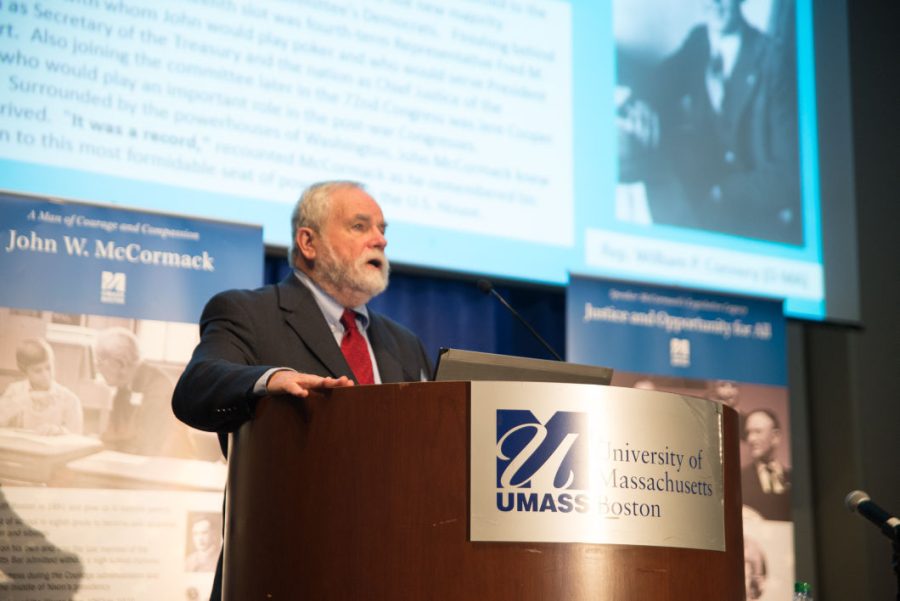John W. McCormack was born into abject poverty, but would go on to move through the Boston political environment, and eventually serve as the Speaker for the House of Representatives. The McCormack Graduate School of Policy and Global Studies is named in honor of a man who would be remembered as tall, quiet, and a fighter for the disadvantaged.
On Nov. 6, at event entitled “Promises Kept: John McCormack, Social Security, Medicare, and Medicaid,” several scholars in the field of Politics and Community Service talked highly of John McCormack as man who personified the spirit of fighting for the less fortunate.
“[Garrison Nelson] is going to talk to us about who we are; [the man] for which the [McCormack Graduate] school is named,” said Bob Turner in his opening remarks.
The event, which was held in the Campus Center Ballroom, was an installment in the Woods Lecture Series and following the lecture was a panel discussion.
“[Nelson’s] work focuses on the efficacy of politics, political institutions, and individual politicians,” said Turner, a previous editor and journalist of 25 years at the Boston Globe, and current chair of the Woods Lecture Series committee.
Nelson is a professor of Political Science at Vermont University and a former McCormack Graduate School fellow. The most recent addition to his prolific bibliography is, “John William McCormack: A Political Biography.”
John McCormack was born near Andrew Square in South Boston, one of 12 children in a family that moved frequently to avoid eviction. In the 8th grade he left school to work — providing financial support to his family with a meager salary.
This job led to one in an law firm and as the young McCormack began entering Boston political circles he attended law school at night. He passed the Massachusetts bar exam at age 21, having never gone to high school.
McCormack fictionalized his backstory to fit in with the other Irish politicians in Boston. He wasn’t the eldest of his siblings, and he didn’t have an Irish father or a widowed mother.
“Because of John McCormack’s reinvented life, he was able to make a difference and make life enormously better for the people like himself who had suffered great hardships,” said Nelson, who described the politician as “complex” and hard to research because of his secretive nature.
The Social Security legislation of 1935 was transformed by McCormack from a retirement program for workers to a family based economic security program.
“[This] legislation that McCormack expedited through Congress changed lives,” said Garrison.
McCormack fought for racial equality on many scales, from being an early opponent of Adolf Hitler in the House, to mandating that the staff barbers could no longer pass over the black staff members.
At the peak of his career, McCormack was the second most powerful man in the world as the Speaker for the House of Representatives, following the death of John F. Kennedy and the subsequent swearing in of Lyndon B. Johnson as president. McCormack was next in line.
Sitting on the discussion panel was Ira Jackson, alongside David King, a professor at the Kennedy School of Government at Harvard, and Monica Garlick, a Public Policy PhD candidate at the McCormack Graduate School.
Ira Jackson, Dean of the McCormack Graduate School, said that McCormack in his retirement lived in an apartment on Columbia Road in Dorchester, a humbling contrast to a modern congressman.
The Robert C. Wood Lecture Series, since its establishment in 1998, has been bringing professors to UMass Boston yearly to give lectures and to engage on topics relating to politics and public policy. Wood was a president of the UMass school system between 1970 and 1977.
The next Wood Lecture Series will be held in the spring, and will feature Harvard professor and urban sociologist, William Julius Wilson.





















































